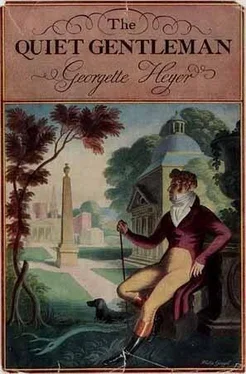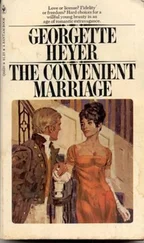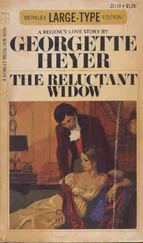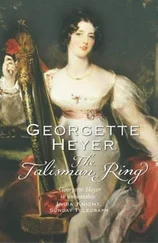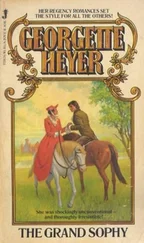“A blow!” commented the Earl.
“Yes, but she has sustained it with fortitude, and we have great hopes that my younger brother, who is now at Cambridge, will become distinguished. And, after all, there must be someone in a household who does not dislike domestic management.”
“Is that your fate, Miss Morville?” the Earl asked, rather touched. “Is your life spent in these rural fastnesses, performing a housekeeper’s duties? I pity you!”
“Well, you need not,” returned Miss Morville unromantically. “We are only to be found in Lincolnshire when Papa requires quiet for the performance of his labours. In general, we reside in London, so that Mama may enjoy the benefits of literary society.”
“Forgive me, ma’am, if I say that it sounds to me like a dead bore!”
“Oh, yes, to those who are not bookish, it is!” agreed Miss Morville. “When in London, I spend much of my time in the company of my aunt, Lady Morville, and my cousins. Parties, and theatres, you know, for they are always very gay, and most good-natured in including me in their schemes. My aunt even undertook my Presentation last year, which, when you consider that she had three daughters of her own to bring out, you must allow was very handsome in her. Particularly when Mama had declared herself ready to sink her scruples, and to perform the duty herself. Neither Mama nor Papa approves of Royalty, of course. But neither, I assure you, is an advocate of the more violent forms of Jacobinism.”
“I am relieved. They would not, you think, wish to see such heads as mine fall under the knife of the guillotine?”
“I shouldn’t think they would wish to see any head do so.”
While they had been talking, they had mounted the Grand Stairway, crossed the hall at the head of it, and now entered the Long Drawing-room. The Earl enquired: “Where are you taking me, Miss Morville?”
“To the Small Dining-room, if you please. I wish you to inform me whether you approve of what I have done with the epergne, or whether you would prefer some other arrangement.”
“What you have done with it? Pray, why should you be called upon to do anything with it?”
“Well, I was not precisely called upon, but someone had to decide what was to be done, when all you would say was that it should be stowed away in a dark cupboard!” she pointed out. “Poor Abney was quite bewildered, you know, for he could not suppose that you meant it; and as for Lady St. Erth, she says that after what has passed nothing will prevail upon her to raise her voice in the matter.”
“I am delighted to hear it. A dark cupboard seems to be the only place for such a hideous object. Do not tell me that you admire it!”
“No, not at all, but I don’t consider myself a judge, and what I might think ugly other people, perhaps, would consider a very handsome piece.”
“Let me make it plain to you, Miss Morville, that I will not sit down to dinner with that thing in the middle of the table!”
“You could not, for now that the table has been reduced, which, I must say, was a very good notion, there is no room on it for the epergne. But now and again, I daresay, you will wish the table enlarged to accommodate more persons, and the epergne can be set upon it for the occasion. It is certainly very disagreeable to be obliged to crane one’s neck to see round it, when one dines informally, and it may be thought allowable to converse with persons seated on the opposite side of the table; but on more state occasions that would be a sadly ill-bred thing to do, and the epergne need be an annoyance to no one.”
“I hesitate to contradict you, ma’am, but it must always be an annoyance to me,” said Gervase.
“Not,” said Miss Morville, “if it were turned so that you were not confronted by a snarling tiger. When Abney brought me here this morning, to consider what was to be done, I instantly perceived that you had been obliged, throughout the meal, to look at this creature; and, naturally, I realized that the spectacle of a ferocious beast, in the act of springing upon its prey, could not be thought conducive to conviviality, and might, indeed, be offensive to a person of sensibility. But on the reverse side,” pursued Miss Morville, preceding the Earl into the Small Dining-room, “there are a group of natives gathered beneath a palm tree, two peacocks and an elephant, with trunk upraised. Quite unexceptionable, I think!” She halted inside the Dining-room, and indicated a Buhl table, placed in the window embrasure. “You see, I desired Abney to have that table from the Crimson Saloon carried into the room, and have caused the epergne to be set upon it; but if you do not like it, it can be moved.”
“A dark cupboard!” said the Earl obstinately.
“Recollect that you will be seated with your back turned to it!” begged Miss Morville.
“I should suppose the tiger to be leaping upon me.”
“Oh, no, indeed you could not, for it is facing the window!”
“Unanswerable! Pray, why are you so anxious to preserve the epergne, ma’am?”
“Well, I think Lady St. Erth might be a little mollified, if it were still in the room; and it would be quite improper, you know, to consign all your heirlooms, which you do not like, to dark cupboards,” said Miss Morville reasonably. “I daresay there are several changes you will wish to make at Stanyon, but it is a favourite saying of my brother Jack’s — my military brother — that one should always try to get over heavy ground as light as one can.”
He smiled. “Very true! In what regiment is your military brother?”
“A line regiment: I daresay you would not know,” said Miss Morville. “ You , I collect, were in the 7th Hussars — one of the crack cavalry regiments!”
The Earl, a little shaken, admitted it.
“The Lilywhite Seventh,” said Miss Morville indulgently, shepherding him out of the room. “ I know!”
“And the devil of it is,” said the Earl, twenty minutes later, to his cousin, “that I have let that wretched chit talk me into permitting the continued existence of that abominable epergne in my dining-room!”
The Earl spent the rest of the morning in the muniment room, docilely permitting his cousin to explain the management of his estates to him, and to point out to him the various provisions of his father’s will. Besides the very considerable property which had been left to Martin, personal bequests were few, and included no more than a modest legacy to the nephew whose diligence and business ability had made it possible for him to spend the last years of his life in luxurious indolence.
Theodore Frant was the only offspring of the late Earl’s younger brother, who, in the opinion of his family, had crowned a series of youthful indiscretions by marrying a penniless female of birth considerably inferior to his own. His tastes had been expensive, and a passion for gaming had made him swiftly run through his patrimony. His wife survived the birth of her child only by a few weeks; her place was filled by a succession of ladies, ranging from an opera-dancer to a fruit-woman, according to the fluctuating state of his finances; and the Earl, upon the only occasion when he was constrained to visit his disreputable relative, finding his youthful nephew engaged in bearing a quartern of gin upstairs to the reigning mistress of the establishment, acted upon the impulse of the moment, and bore the sturdy boy off with him, to be reared with his own two sons at Stanyon. His brother, though he had hoped for more tangible relief, raised no objection, reflecting that in moments of acute stress the Earl’s purse must always be untied for him, his lordship having the greatest objection to allowing any scandal to be attached to his name. Happily for the Earl’s peace of mind, an inflammation of the lungs, contracted during a wet week at Newmarket, carried the Honourable John off three years later.
Читать дальше
